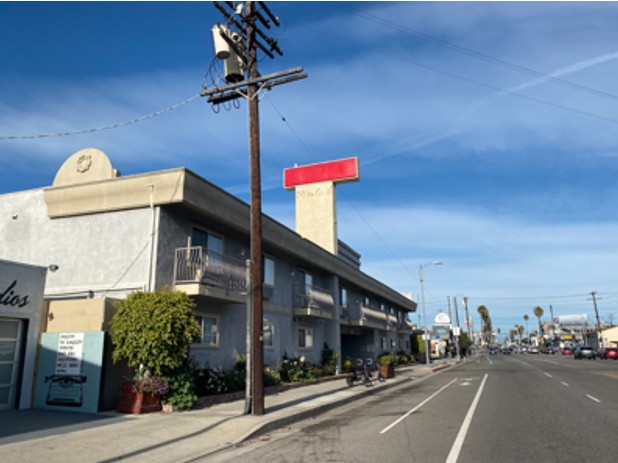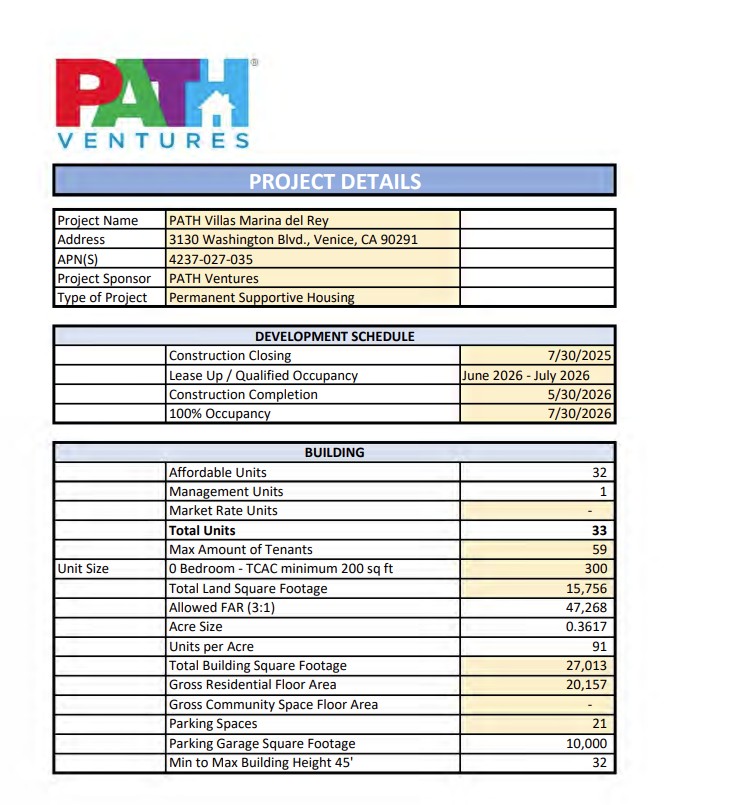
This Ramada on Washington Boulevard was suppose to house the homeless. It has been vacant for three years.
Photo: Westside Current
By ANGELA MCGREGOR
Launched under former councilmember Mike Bonin with no clear plan, the Venice Ramada project displaced unhoused residents, burned through nearly $20M, and remains vacant years later with no timeline for housing.
The Venice Ramada Inn served as interim housing for about 14 months, but was emptied in 2022, so PATH (People Assisting the Homeless) could convert it to permanent housing. As of now, more than $19.5 million in grants, loans and private donations have gone toward the project and no construction has taken place. The site, at 3130 Washington Boulevard, will be vacant for three years in October.
A Westside Current May 2024 story (“Nonprofit Secures $3M Grant, Pushing Ramada Homeless Housing Project to $17M for 33 Units”) reported the controversial project of converting a 33-unit former Ramada Inn, a mile from the Venice Pier, into permanent homeless housing had secured $3 million in Federal HUD funding, bringing the total cost of the project to $17 million.
Then representatives of PATH Ventures, the project’s owner and developer, told the Current that they “expected to secure permits within the next month or two and to begin construction this summer…as of now, the project should be completed in the first three months of 2025.”
The $11 million, Homekey-funded zero interest loan the City extended to PATH in December 2020 to purchase and renovate the property comes due on December 16, 2025, or upon “the closing of construction financing for conversion to permanent housing,” whichever comes first.
Recently, the Current filed a public records request for communication between the City Administrator’s Office and PATH Ventures. According to the dozens of documents we received, in May of 2024 representatives from PATH Ventures were telling the CAO that a $1.5 million “funding gap” was preventing them from moving ahead while publicly stating that the project was on the verge of commencing construction.
On May 22, 2024, CD11 Councilperson Traci Park put forward a motion to the City Council asking that the CAO provide a report within 30 days on the status of the Ramada Inn project. “Given the Homekey program was presented as an expeditious alternative to new construction, which can be cost and time prohibitive, the City should understand immediately why Homekey units continue to sit empty while thousands of individuals continue to live and suffer on sidewalks outside these properties,” she wrote.
On July 2, 2024, the motion was adopted. The CAO informed the Current that the report should be released “hopefully within two weeks or so.”
But on June 6, 2024, the Ramada’s Project Director, Dahlia Leffell, wrote to Assistant City Administrator Yolanda Chavez that “The project is facing two challenges at this point. First, we have a financing gap of $1.5 million that we need to fill. Second, without a master lease or some other solution, the project will not be able to operate once the conversion is completed.”
Chavez replied on July 1 asking if PATH could start construction while still raising the funds. “As you noted, everyone is eager for you to start construction…on the tenant issue – the CAO is still working on this. Master leasing may not be an option.”
On August 22, Chavez asked PATH to “send over your proforma for the Ramada Inn…we are going to recommend Prop HHH funding for the remaining gap.”
PATH Ventures was ultimately able to obtain rental subsidies for the Ramada’s future residents through Brilliant Corners, a public/private partnership led by the Los Angeles County Department of Health Services. But they could not begin work until they had closed on their construction loan, and that wasn’t possible until all their funding was in place.
In an email dated September 20, 2024, Leffell explained that “this [funding] gap was caused by escalating holding costs due to an extended plan check, unanticipated additional scope, and rising construction costs…We’re looking at holding costs of around $25,000 a month (including 24-7 security, insurance, and maintenance to avoid further work needed).
At their December 3 meeting the Council voted unanimously to adopt a motion put forward by the Housing and Homelessness Committee to approve the Prop HHH funding commitment for the Ramada in the amount of $1,525,457.
On December 9, GenesisLA, a community financial institution founded in 1998 by former LA Mayor Richard Riordan in order to fund investment in the “city’s most economically distressed communities” extended a $1.25 million construction loan to the project, bringing the total amount of funds received to $19,527,673.65.
But by March 4, 2025, even that amount was deemed insufficient, according to an email from Projector Director Alvarez. Writing to Michelle Chow in the CAO’s office, she stated, “while the project was fully funded at the time of LAHD’s commitment in December, additional factors have emerged that are impacting hard costs.” An “unprecedented” request from LADBS for individual water meters for each unit and “prevailing wage updates” were putting a strain on the budget, as well as the possibility that the $3 million in HUD funds that were earmarked in May of last year would now be clawed back. If that happens, Alvarez wrote, it would “also create a financing gap”.
The project which, according to its 2021 Coastal Development Permit, was estimated to cost $382,220 for renovation of the entire 32-unit building. Now four years later, each renovated unit is expected to cost $300,000.
According to the City Administrator’s office, the project is still on track to begin construction “by September,” once the loan from GensisLA has closed. The original, $11 million Homekey loan is being converted into a “residual receipts loan” to be administered by the L.A. Housing Department.
This loan will be paid back over the 57 years the project is mandated to be low-income housing, with payments made from any revenue the developer obtains through rental income that isn’t spent on operating the property. As for the $3 million in HUD funding, according to the CAO PATH Ventures has avoided it being clawed back by spending it to maintain the property since it was earmarked.
At a recent visit to the site at around 9 a.m. on a Tuesday morning, the Current found no on-site security, save for some bright lights installed along the periphery of the parking lot. The fence at the back of the property, along Harrison Street, was nearly completely rusted through.
A construction site notice was taped to one of the windows, announcing a change of use from “30 transient hotel guest rooms to non-transient hotel guest rooms.” That permit, dated April 1, 2022, lists the owner of the property as Marina Suites, Inc., the operator of the Ramada Inn at the time it was purchased in 2020. A title search for the property shows the owner, as of December 17, 2020, as PATH Ventures. On the PATH Ventures website, a page, which in December displayed the upcoming “PATH Villas Marina Del Rey” now throws a 404 error.
In September, 2024 the Current reported that over 70% of L.A. County’s Project Homekey-funded homeless housing projects, many of them former hotels and motels, are sitting vacant.
(Editor’s note: the story first appeared in the Westside Current and is reprinted with permission. As an FYI, PATH, a nonprofit, uses about 37.9% of its profits for executive compensation and salaries. According to ProPublica and from the 990, PATH’s net assets for 2024 are $17,067,261.)


My prediction: this project will never be completed and there will be no audit of where the 20 million has gone.